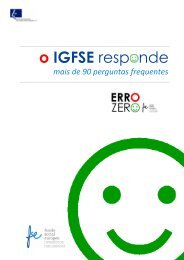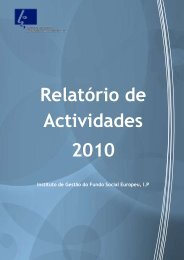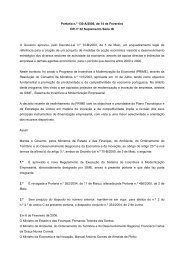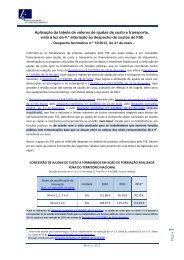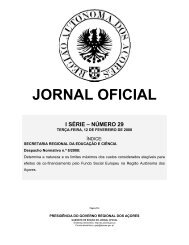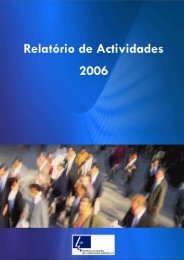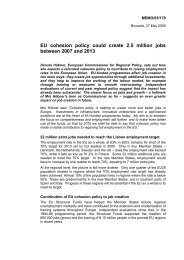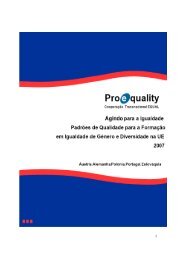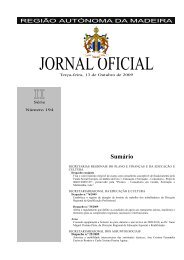Industrial Relations in Europe 2012 - European Commission - Europa
Industrial Relations in Europe 2012 - European Commission - Europa
Industrial Relations in Europe 2012 - European Commission - Europa
You also want an ePaper? Increase the reach of your titles
YUMPU automatically turns print PDFs into web optimized ePapers that Google loves.
IT<br />
LV<br />
LT<br />
LU<br />
MT<br />
NL<br />
PL<br />
PT<br />
RO<br />
SE<br />
SI<br />
SK<br />
armed forces.<br />
There are no particular restrictions on the right to strike for public servants but<br />
services at m<strong>in</strong>imum level must be guaranteed <strong>in</strong> ‘essential’ public services. A<br />
ban on strike action exists for military personnel and state police.<br />
A ban on strike action exists for: judges, prosecutors, police, fire-fighters with<br />
public service status, border guards, state security, prison warders, and armed<br />
forces.<br />
Strikes are forbidden <strong>in</strong> public electricity, district heat<strong>in</strong>g and gas supply<br />
enterprises, as well as <strong>in</strong> the case of heads of department and senior civil<br />
servants, employees <strong>in</strong> <strong>in</strong>ternal affairs, national defence and state security<br />
organisations.<br />
Prohibited from strik<strong>in</strong>g are: diplomats, members of the judiciary, senior civil<br />
servants and managers, armed forces, police, medical and security personnel.<br />
Restrictions to strike action are <strong>in</strong> place for: doctors, surgeons, armed forces,<br />
police, fire-fighters, prison officers, and air traffic controllers.<br />
The vast majority of the contract<strong>in</strong>g parties grant the right to strike to civil<br />
servants. Military personnel and police officers also have the right to strike. A<br />
Dutch judge may determ<strong>in</strong>e whether recourse to a strike is premature.<br />
Civil servants may not participate <strong>in</strong> strikes. The right to strike is restricted<br />
when a work stoppage entails a danger to human life, public health and to state<br />
security. Members of the armed forces, the police, border guards and prison<br />
services are, as area all categories of civil servants, denied the right to strike.<br />
The right to strike is recognised for all workers <strong>in</strong>clud<strong>in</strong>g public employees.<br />
Exceptions are: Members of armed forces and police are prohibited from<br />
strik<strong>in</strong>g.<br />
Public servants <strong>in</strong> the m<strong>in</strong>istry of defence and <strong>in</strong>terior do not have the right to<br />
strike. Further, the vote threshold <strong>in</strong> strike ballots is very high - 50%. Certa<strong>in</strong><br />
services such as health services, social assistance and public transport must be<br />
ma<strong>in</strong>ta<strong>in</strong>ed dur<strong>in</strong>g the strike at the level of at least 1/3 of normal activity.<br />
Virtually unlimited right to strike, but <strong>in</strong> the private and public sector the<br />
parties to a collective agreement may not <strong>in</strong>itiate labour disputes on the issues<br />
covered by collective agreements dur<strong>in</strong>g the period of validity (statutory peace<br />
obligation). The only restriction is that <strong>in</strong>dustrial action must not be directed at<br />
<strong>in</strong>fluenc<strong>in</strong>g Sweden’s’ political situation. Restrictions exist for public<br />
employees engaged <strong>in</strong> work <strong>in</strong>volv<strong>in</strong>g decision mak<strong>in</strong>g, workers <strong>in</strong>volved <strong>in</strong><br />
the exercise of public authority (for example, the courts).<br />
Strikes are not permitted when they are not related to the negotiation or<br />
amendment of a collective agreement. Only national or local branches of<br />
unions are allowed to call strikes. The follow<strong>in</strong>g groups are prohibited from<br />
tak<strong>in</strong>g strike action: judges, prosecutors, armed forces, fire-fighters and air<br />
traffic controllers.<br />
Strikes must be l<strong>in</strong>ked to collective agreements. Strikes are prohibited for:<br />
judges, prosecutors, armed forces and armed corps, fire-fighters, air-traffic<br />
controllers. The right to collective action is also restricted <strong>in</strong> social services,<br />
health care, telecommunications, gas and oil production and the nuclear sector.<br />
41



